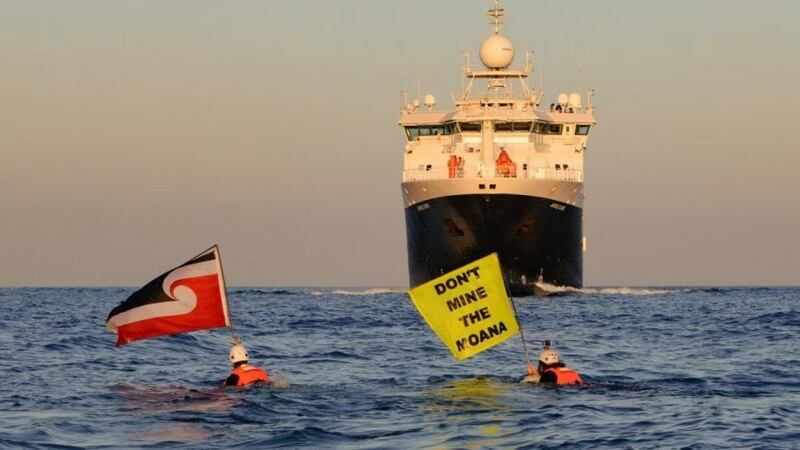Quack Pirihi and James Hita confronting UK research ship James Cook in East Pacific waters as it returned from a seven-week long expedition to a section of the Pacific Ocean targeted for deep-sea mining. Photo / Martin Katz, Greenpeace
Māori Greenpeace activists have jumped in front of a deep-sea mining research vessel, UK Royal Research Ship James Cook, off the coast of Costa Rica today.
Flying the Tino Rangatiratanga flag and a banner reading “Don’t mine the Moana”, the activists took to the East Pacific waters in what they called a “peaceful protest”.
Quack Pirihi, 20, (Ngāpuhi, Ngāti Wai, Ngāti Porou, and Ngāti Whātua o Kaipara) from Auckland says: “I’m proud that I was able to bring my tūpuna with me and bring rangatahi Māori with me - through the flying of the Tino Rangatiratanga flag.
“This kaupapa is so much more than me. It is the future of the moana and has the oppprtunity to destroy our oceans until the end of humankind.”
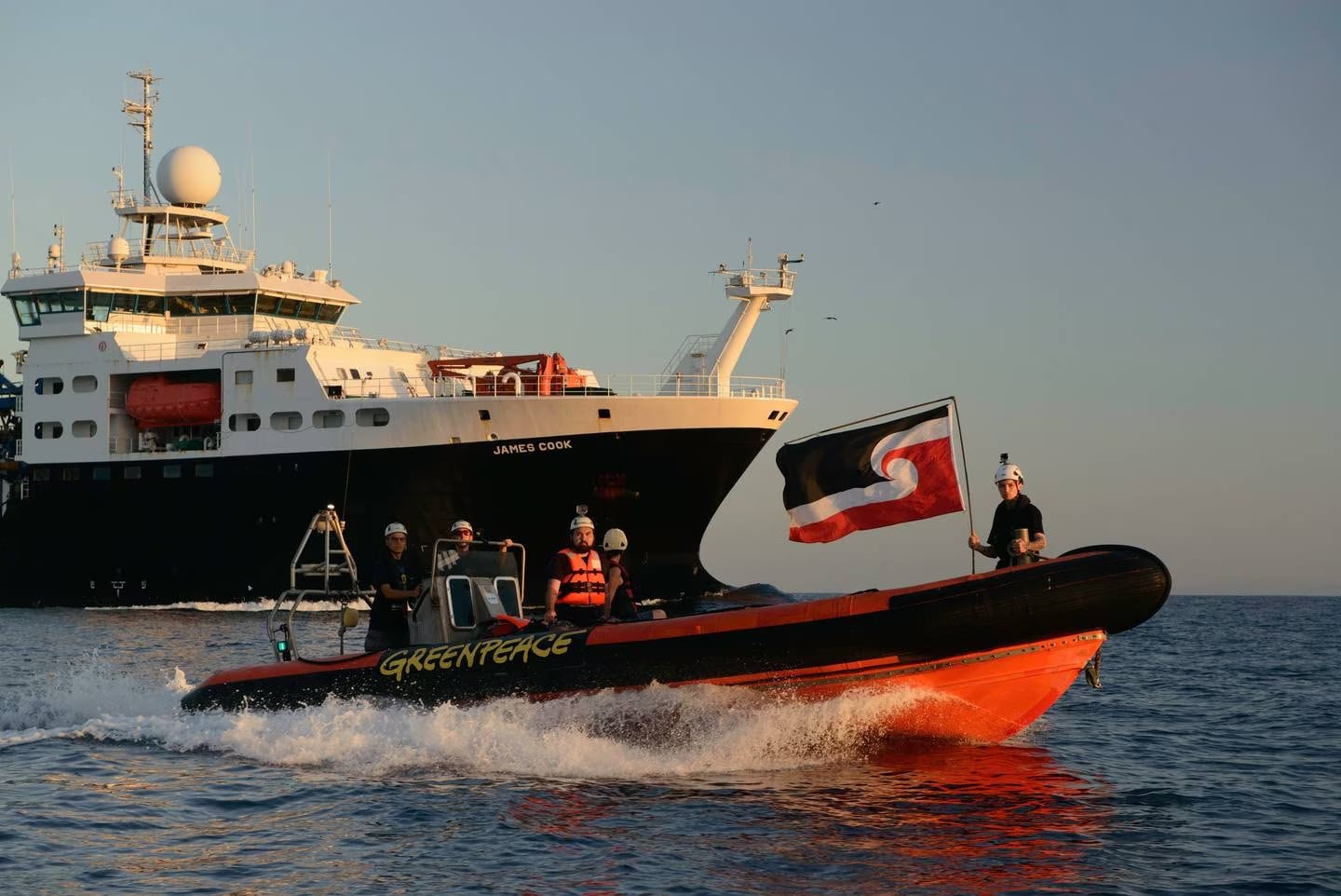
Quack Pirihi holding the Tino Rangatiratanga flag, protesting deep-sea mining in the Pacific with Greenpeace. Photo / Martin Katz, Greenpeace
Pirihi is part of a Pacific delegation aboard Greenpeace ship Arctic Sunrise stationed in Kingston, Jamaica this month to protest deep-sea mining at the 28th International Seabed Authority (ISA) conference.
This is the first time a Pacific voice will be heard at the ISA meeting, despite the impact of ISA decisions on the future of Pacific peoples.
“Our intention was to show that we are watching, and this isn’t okay. We must not let mining start in the Pacific,” Pirihi said.
“Why must we deal with the destruction of our moana when we are still healing from the destruction they left behind on our whenua? This is modern-day colonisation”.
The Arctic Sunrise intercepted the James Cook as it returned from a seven-week expedition of the Pacific Ocean targeted for deep-sea mining.
Greenpeace Aotearoa campaigner James Hita, of Ngāti Whātua o Oruawharo/Te Turi o Hau, says: “For too long, Pacific peoples have been excluded from decisions that impact our territories and waters. If governments don’t stop this industry from starting, a new cycle of colonial exploitation will begin. We reject a future with deep-sea mining.”
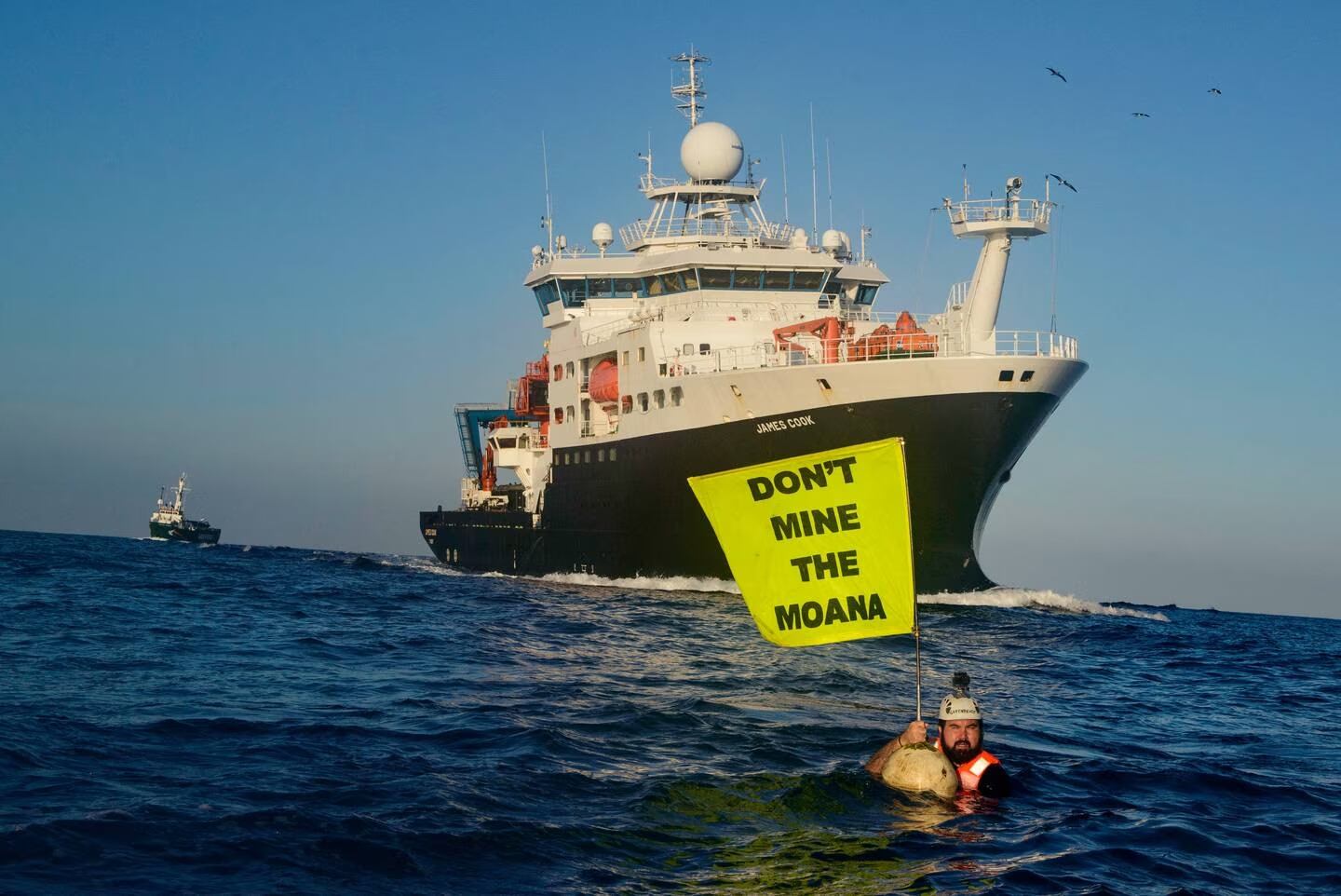
James Hita in the East Pacific Ocean protesting deep sea-mining as part of a Greenpeace Pacific delegation to the 28th Session of the International Seabed Authority. Photo / Martin Katz, Greenpeace
Hita says that Greenpeace has requested the findings of the expedition, but the group are not planning to release any of it publicly.
“It will be used for industry and that’s not fair especially when part of that expedition is funded by the UK taxpayer,” Hita said.
The name of the UK research vessel, James Cook, brings the confrontation even closer to home and history for Hita and Pirihi.
“For it to be named after the most notorious coloniser of the Pacific is a really cruel and harmful insult, not only to the people of Aotearoa but to the whole Pacific.”
Greenpeace questions industry interest behind the expedition
The research vessel James Cook, on the “Smartex Expedition”, returned to sites where previous test mining took place in 1979 to monitor long-term impacts of mining but also to research how to “reduce the risks” as part of “developing a sustainable approach” to deep-sea mining.
Greenpeace says this is a “smokescreen”, and that the project forms part of the deep-sea mining industry’s development programme and is being used to enable the nascent deep-sea mining industry.
“While political tensions flare in Jamaica right now over whether to allow deep-sea mining to start, commercial interests are pressing ahead at sea like it’s a done deal,” Hita said.
The action at sea took place as world delegates debated, at the International Seabed Authority (ISA), whether to approve the first application to mine the deep.
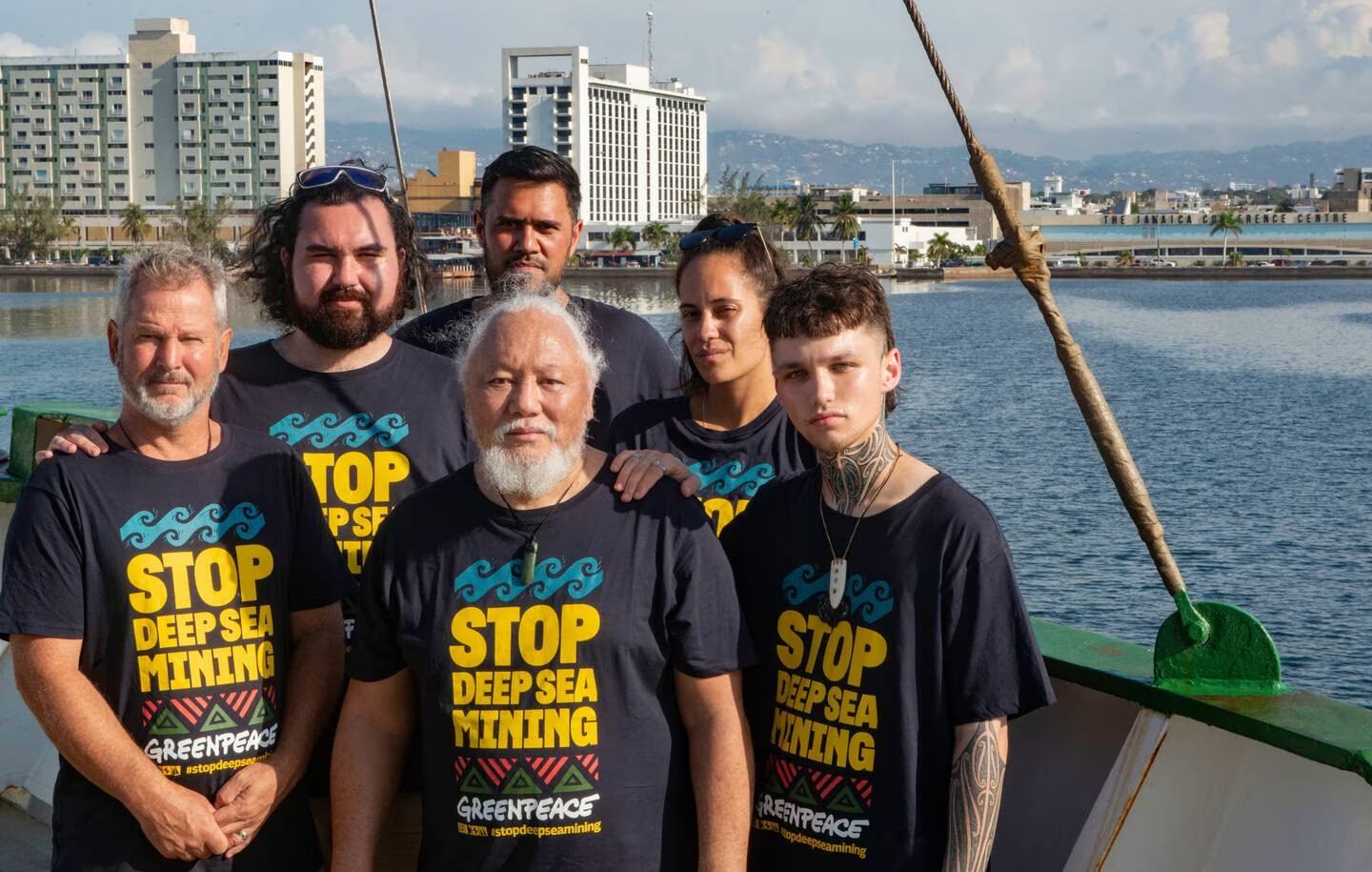
Protecting the Pacific: Greenpeace activists in Kingston, Jamaica for the 28th Session of the International Seabed Authority conference. Photo / Martin Katz, Greenpeace
Will ISA protect our oceans?
The ISA is the organisation through which states party to United Nations Convention on the Law of the Sea organise and control all mineral resource-related activities in the area.
The ISA has the mandate to ensure the effective protection of the marine environment from harmful effects that may arise from deep-seabed-related activities.
However, Greenpeace says the deep-sea mining industry has forced governments’ hands, using an obscure and controversial legal loophole to set an ultimatum for governments.
In 2021, the president of Nauru, Lionel Aingimea, together with The Metals Company’s subsidiary Nauru Ocean Resources, triggered a “two-year rule” that puts pressure on governments at the ISA to allow deep-sea mining to start by July 9 this year.
Aingimea notified the ISA of the intention to apply for approval to begin mining this year in the North Pacific Ocean between Hawaii and Mexico, known as the Clarion-Clipperton Zone (CCZ).
The letter asked the ISA “to complete the adoption of rules, regulations, and procedures required to facilitate the approval of plans of work for exploitation in the area”.
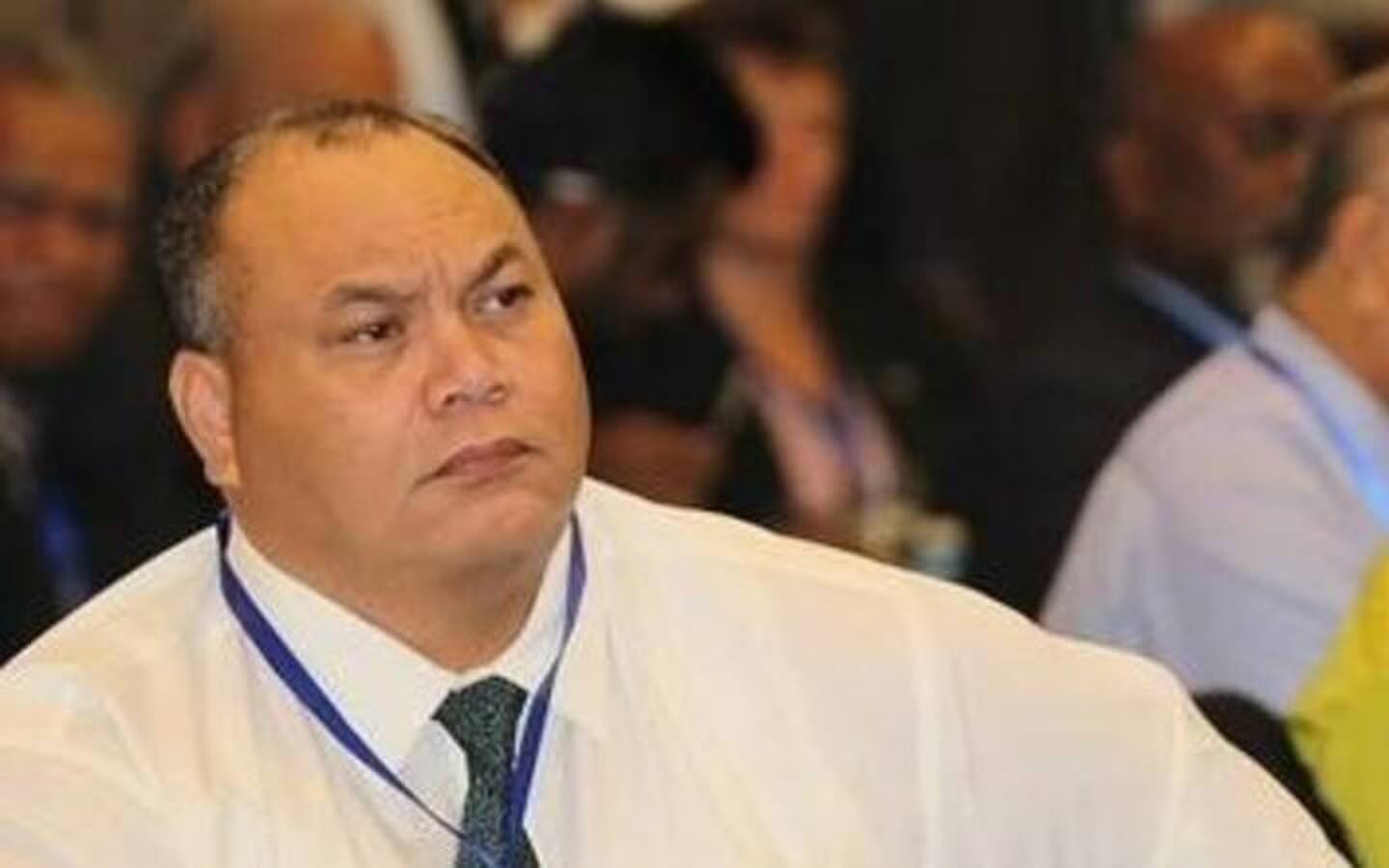
Nauru's President Lionel Aingimea. Photo / RNZ
Greenpeace International senior oceans policy adviser Sebastian Losada says the two-year rule puts the interests of the few over the many and would make it impossible for governments to fulfil their key obligation to protect oceans.
“The same states that completed negotiations to protect the oceans must now draw a line and ensure that the deep sea is protected from mining. They can’t allow this reckless industry to go ahead,” Losada said.
“Many governments have voiced unease at pressure to rush vital political negotiations over equity and ocean health. The future of half the surface of the planet has to be decided in the best interests of humanity - not the timeframe imposed by a company running out of cash.”
Last week, diplomats accused the head of the ISA, Michael Lodge, of having lost the impartiality demanded by his position and interfering with the decision-making of governments at the ISA to accelerate mining.
The deep sea is still a pristine ecosystem
The Environmental Justice Foundation (EJF) says that deep-sea mining will cause significant disturbances to the marine environment.
There would be direct damage to benthic fauna (deep-sea creatures), habitat destruction, pollution from sediment plumes, wastewater discharge, and noise and light pollution.
These disturbances will result in biodiversity loss, disrupt marine ecosystem functions and food webs, and potentially impact fisheries and disrupt the oceanic carbon cycle.
Almost the entirety of the world’s carbon dioxide (98 per cent) is dissolved in the ocean, which also stores 90 per cent of the excess heat produced through greenhouse gases, supporting the survival of species across the globe.
“The deep sea is still a pristine ecosystem, largely untouched by human activity. It covers 65 per cent of the seafloor and makes up more than 95 per cent of the Earth’s biosphere, with a staggering diversity of life on a par with that of tropical rainforests. We all depend on it; the deep sea underpins all ocean ecosystems and plays an important part in the global carbon cycle,” the EJF said on its website.
More than 700 scientists from 44 countries have already opposed the industry by signing an open letter calling for a pause.
Hita says: “We are asking the International Seabed Authority and delegates to take action and to make the discussion political.
“Stand up for Te Moana Nui a Kiwa and protect it by not allowing mining to go ahead.”

